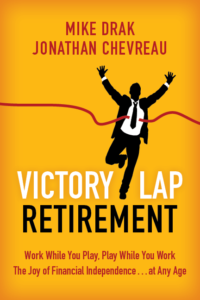 Whaaaat? Is it possible that this whole retirement thing can be a letdown once you finally get there — that some people may experience the Retirement Blues?
Whaaaat? Is it possible that this whole retirement thing can be a letdown once you finally get there — that some people may experience the Retirement Blues?
My latest MoneySense Retired Money column looks at the problem of having too much free time in your golden post-employment years, which you can find by clicking this highlighted headline: Retiring frees up 2,000 extra hours a year.
In the piece, I describe at least one senior who felt in retrospect that he retired too early: he had a great pension so money wasn’t a problem but he soon realized he had started to miss the many benefits of work. In short, he had a mild — or not so mild — case of the Retirement Blues.
As you’ll see, the column references an RBC program called Your Future by Design (See www.retirementdesigners.ca).
The 2,000 hours is the result of a simple calculation: 50 weeks multiplied by 40 hours a week equals the amount of “found” leisure time freed up by no longer working full-time. The 2,000 hours figure was referenced in a survey by the Royal Bank last year. Those with long commutes can add a few more hundred hours a year of “found” time.
Keep in mind that if you don’t work at all in retirement you’ll have a lot more than just those 2,000 hours a year to fill. Subtracting 3,000 hours for sleep, you’ll have a total of 5,840 waking hours every year. So if you live 30 more years after retiring, that’s 175,000 waking hours to be occupied.
Little wonder that 73% surveyed by RBC aren’t sure what they’ll do with all that time. We spend more time planning vacations (29%) or weddings (19%) than on retirement!
5 top retirement activities, plus a sixth that should be considered
RBC finds the top five activities for replacing work are health & fitness, travel, hobbies, volunteering and relaxing at home, but I suggest in the column that many recent retirees may discover they want a sixth activity: work, if only on a part-time basis.
Imagine that: doing a little more of what you may have done too much of during your primary career, but enjoying it for its own sake, its networking properties and social stimulation. And, incidentally, adding a little to your retirement nest egg while you’re at it.
 And that of course is the theme of the bestselling book I co-authored with Mike Drak — Victory Lap Retirement. Earlier today, the Hub republished a recent Drak blog where he made the point people shouldn’t conclude that he’s retired and that the fate of many retirees who don’t plan how to fill the extra 2,000 Hours may be “Boredom ahead.” See Me Retired? No way.
And that of course is the theme of the bestselling book I co-authored with Mike Drak — Victory Lap Retirement. Earlier today, the Hub republished a recent Drak blog where he made the point people shouldn’t conclude that he’s retired and that the fate of many retirees who don’t plan how to fill the extra 2,000 Hours may be “Boredom ahead.” See Me Retired? No way.
Last July, another Retired Money column I wrote described the positive financial impact of earning just a thousand or two thousand dollars a month in Semi-Retirement. See Should You Work Part-time in Retirement? Seems to me that for those so inclined, this is a cure for various ills: boredom, feeling isolation, lacking a sense of purpose and even money worries.
Today’s MoneySense column on the 2,000 Hours also references Mark Venning, who has penned some interesting Hub blogs on longevity and super longevity, such as this one: Super Longevity: The 100-year Life in a Blue Zone.
Venning, whose website is at ChangeRangers.com, believes we should be planning NOT for retirement per se, but for longevity. Hence his new tagline, “Recoding a Longevity Society.” Mark also wrote up a two-part review of Victory Lap Retirement, which you can find here.


“what to do with all that time” ???? Really!
I FIREd 10 years ago and would love to have MORE time to do all the things I want to do – I find it really constraining that there are only 24 hours in a day.
Anyone who is “suffering” retirement blues really should give their head a shake.